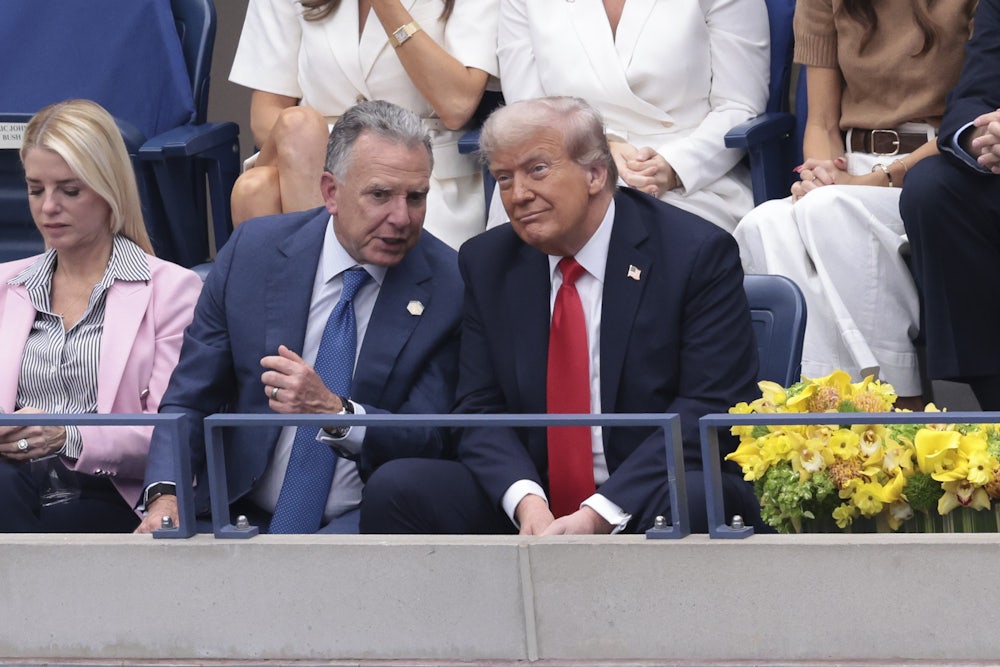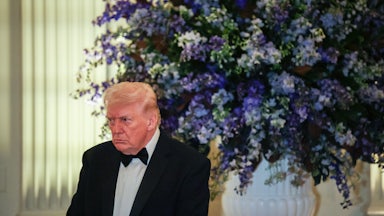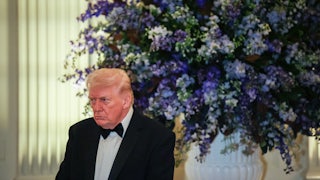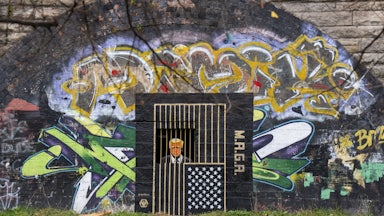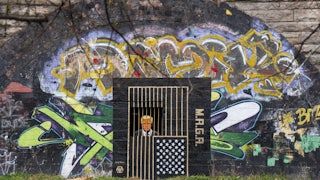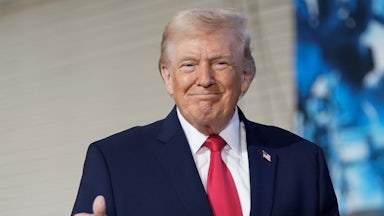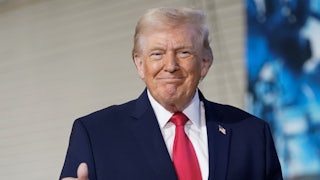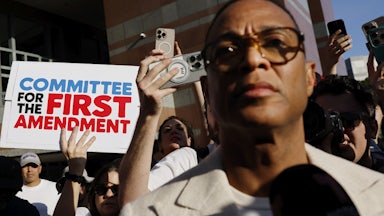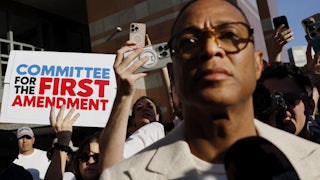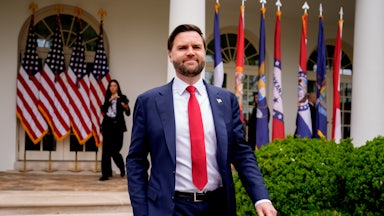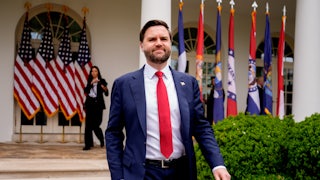In 1922, Interior Secretary Albert Fall collected about $400,000 from two very rich oilmen, Harry Sinclair and Edward Doheny, and granted them government leases to pump $100 million worth of petroleum from Navy reserves in Elk Hills and Buena Vista, California, and in Teapot Dome, Wyoming. It was a family affair, with Fall’s son-in-law M.T. Everhart collecting from Sinclair and Fall himself collecting from Doheny’s son Ned.
The Teapot Dome scandal, which occurred during an oligarchic period not unlike our own, followed a recognizable trajectory. The Wall Street Journal broke the story, Congress investigated, and Fall and Sinclair ended up doing prison time. Everhart received immunity from prosecution and turned state’s evidence against Fall. Ned Doheny, who received no immunity, died during his father’s trial in an apparent murder-suicide with a fellow conspirator (who was also presumed to be Ned’s gay lover). Perhaps out of sympathy, the jury let Edward Doheny walk free.
Now a century has passed and America is once again an oligarchy. But I don’t expect the World Liberty Financial scandal, which bears many similarities to Teapot Dome—and which The New York Times exposed in a superb investigative piece Monday—to follow a recognizable trajectory. That’s because nothing since January has followed a recognizable trajectory.
In the world I know, the Times story would initiate a Justice Department investigation and an impeachment inquiry, and Trump’s Mideast envoy Steve Witkoff could be counted on to resign by week’s end. In the mystifying world we inhabit today, none of these things appears likely to happen. Sometimes that gets me very depressed.
What’s the World Liberty Financial scandal? Here’s the gist.
In May, Zach Witkoff, the 32-year-old son of the billionaire Steve Witkoff, announced at a Dubai conference—while sitting beside Eric Trump—that he’d collected $2 billion from one Sheikh Tahnoon bin Zayed Al Nahyan, who controls the sovereign wealth fund of the United Arab Emirates. That $2 billion purchased a stablecoin called USD1 from World Liberty Financial, a crypto firm of which Witkoff père et fils are co-founders, and in which the Trump family owns a 60 percent stake. It was, according to Binance (another participant in the deal), “the single largest investment into a crypto company” that the world had ever seen.
Around the same time that Zach announced the UAE investment, his father, Steve Witkoff, said he was divesting his own stake in World Liberty Financial. Four months later, though, the White House says Witkoff is “still in the process of divesting.” (High-ranking Trump officials are notorious slowpokes in this regard.)
What was worth $2 billion to UAE? By what we’re supposed to believe is sheerest coincidence, two weeks after Zach Witkoff announced Sheik Tahnoon’s stablecoin purchase, President Donald Trump agreed to allow the UAE to import a large quantity of U.S.-produced AI computer chips, with many of those chips going to a company named G42 that just happens to be controlled by Sheikh Tahnoon. Previously, the Biden administration had sharply limited how many such chips could go to UAE because the country conducted joint military exercises with China, with which G42 had multiple business partnerships. The UAE didn’t like being told no, so after Trump entered office it negotiated a better deal—with, among others, Steve Witkoff.
Another player in this drama is David Sacks, who pushed hard to give UAE expanded access to the AI chips. Sacks is Trump’s AI and crypto czar. He also continues to work for the investment firm he founded, Craft Ventures. In the minds of some White House officials, this presents a potential conflict of interest. (It’s a nice surprise to learn there remain a few ethics-minded people in the Trump administration.) For example, according to a March press release from World Financial Liberty, USD1 reserves are “custodied by BitGo,” which has significant backing from Craft Ventures. The White House counsel finessed all this by giving Sacks a sort of golden ticket that allows Sacks to participate in government decisions that might affect his investments. Albert Fall, eat your heart out!
The role of blabbermouth, played in the Teapot Dome scandal by the prodigal son-in-law Everhart, is played in the World Liberty Financial scandal by Zach Witkoff. In the unlikely event anybody ever turns state’s evidence, put your money on Zach. His compulsive truth telling furnishes this saga with some welcome comic relief.
“We really need to take a page out of His Highness’s and the Emirates’ book,” Zach said at the Dubai conference. “They are just an amazing example of how you can lead with innovation while also maintaining your family values.” The UAE, you may recall, is a tribal autocracy, essentially a monarchy ruled by seven hereditary sheikhdoms. Our present crisis is that we are already taking way too many pages from His Highness and the Emirates’ book.
According to the Times, Zach blabbed to an associate that Sheikh Tahnoon is “a good friend of the family.” (I’ll bet he is.) The Times couldn’t resist adding that Zach named his son Don, after the president. We know this because Trump said so on social media, and in confirming it Zach wrote: “It is an honor to name our son after the greatest President of all time and all that you stand for.” An anthropological aside: Over-the-top sycophancy is how people in Washington signal closeness to the president these days, the more public the better. Exaggerated self-debasement enhances status and demonstrates you’re a person to be reckoned with.
One advantage prosecutors had a century ago was that the Supreme Court had not yet decriminalized bribery to the point where one can convict a politician only if the recipient says, “Thank you, kind sir, for this illegal bribe” and recites the quid pro quo like a catechism. A second advantage is that prosecutors in the 1920s did not have to contend with the Supreme Court’s outrageous decision last year to shield presidents (well, one president in particular) from nearly every conceivable type of prosecution. There’s no reason to believe President Warren G. Harding was culpable for Teapot Dome, except insofar as he was a fathead who kept very bad company. (Harding died of a heart attack before the scandal broke.) But if he were, he would not have enjoyed the benefit of such comprehensive immunity.
Responding to the Times story Tuesday, Eric Trump said, “My father’s the first guy who hasn’t made money off the presidency.” In fact, the Trump family scored an estimated $5 billion on a single day two weeks ago with the issuing of another World Liberty Financial stablecoin, WLFI. Trump himself, who was worth $2.3 billion a year ago, is worth $7.3 billion today, according to Forbes, and I have yet to see any evidence that he invested a single cent of his own money to get there.
Our brains are not wired to comprehend presidential corruption on this scale. Nor is our government, I fear, equipped to address a financial scandal as enormous as the one revealed in the Times. It’s just another Tuesday in Pottersville. Please, somebody prove me wrong.
